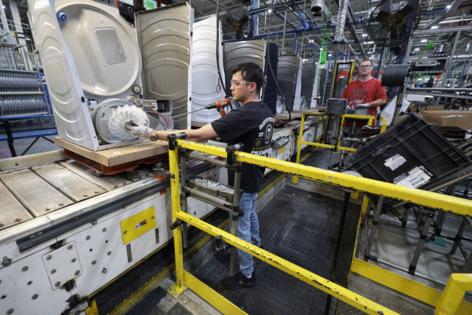Commentary: How we can prepare young people for meaningful work and flourishing lives
Published in Op Eds
America is aging rapidly.
By 2034, there will be more seniors than children for the first time in our country’s history. Meanwhile, the federal debt has exploded and will be the equivalent of a second mortgage for today’s youth.
Young people, in turn, will be called on to produce more to support an aging population and will be forced to pay more to cover past and current government largess.
Even more troubling, millions of young Americans are drifting without the skills, discipline and opportunities they need to succeed.
Twenty-five years ago, the majority of young Americans were working. Today, fewer than half of those ages 16-24 are employed. That’s a gap of 4.5 million young people who are not gaining the formative lessons that come from first jobs.
Whether in fast food, retail or entry-level office jobs, those first paychecks teach important life skills like showing up on time, being respectful and staying on task even when the work is difficult or boring.
Many K-12 schools aren’t doing their part to prepare young people to be reliable workers and responsible adults. Test scores have stagnated, grade inflation is rampant, and discipline and accountability are lacking.
The result, as scholar Samuel Abrams described it, is “the quiet unraveling of a trait that built civilization.” The trait Samuels is referring to is “conscientiousness,” and as he goes on to explain, younger Americans are growing careless and distracted. They’re less tenacious and resilient. They make fewer commitments and fail to follow through on the ones they do make.
Families play the most important role, but they are often forced to push back against schools, culture and government policies that fail to instill the values and competencies young people need.
Higher education hasn’t helped. Hundreds of billions of dollars in subsidies flowing out of Washington have inflated tuition, saddled students with record debt and fueled a proliferation of degrees that don’t pay off. More than a third of undergraduate programs today have a negative return on investment, and only 60% of students who enter college earn a degree within six years.
Alternatives with proven success are massively underutilized. Apprenticeships are one of the clearest bridges from education to work, including zero debt and high earnings. A Harvard study found it possible to triple the number of occupations served by apprenticeships and increase the number of jobs filled by them eight-fold.
When employers have the resources to navigate costly red tape, and they take the lead, results are dramatic.
Toyota’s Federation for Advanced Manufacturing Education began in 2010 and has grown into an industry-managed program. Students split time between paid, on-the-job training and classroom instruction, graduate with associate degrees in advanced manufacturing, and 90% are hired by sponsoring employers. Five years after completion, participants earn 86% more than their peers.
At the K-12 level, states like Florida and Arizona have demonstrated the success of school choice programs that give families options for their children’s education. As other states have followed suit, half of U.S. students are now eligible for some form of private choice program. Additionally, in the past two years, more than half of states passed laws limiting cellphone use in schools. By reducing digital distractions, schools are helping students learn better, feel safer and become more conscientious.
At the federal level, the recently enacted One Big Beautiful Bill Act expanded 529 education savings accounts and put restrictions on student loan subsidies for degree programs that don’t lead to higher future earnings.
These examples show pockets of hope and positive momentum. But we need more education opportunities that prepare young people for meaningful work and flourishing lives.
Policymakers should allow apprenticeships to expand outside the government-monopoly model, phase down federal subsidies that drive up tuition, replace failed federal job-training programs with employer-led initiatives, and make welfare programs more work-oriented.
The stakes are high. America’s aging population and rising debt mean today’s young people will bear heavier burdens than any generation before them. They must be equipped not only with academic knowledge, but with the habits, skills, resilience and opportunities that make them capable of sustaining their families and our republic.
____
Rachel Greszler is a senior research fellow in workforce and public finance at the Heritage Foundation and a visiting fellow in Workforce at the Economic Policy Innovation Center.
_____
©2025 Tribune Content Agency, LLC.
























































Comments